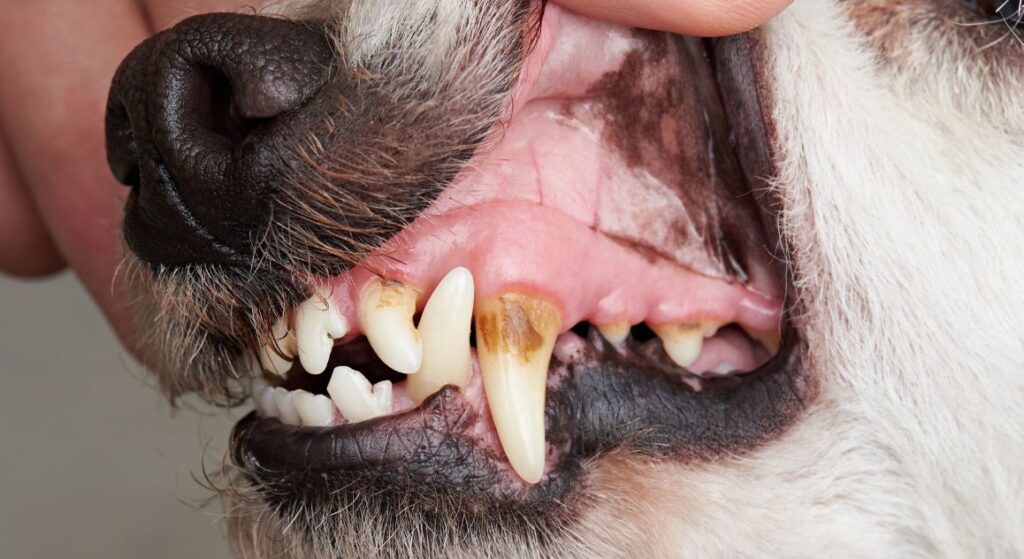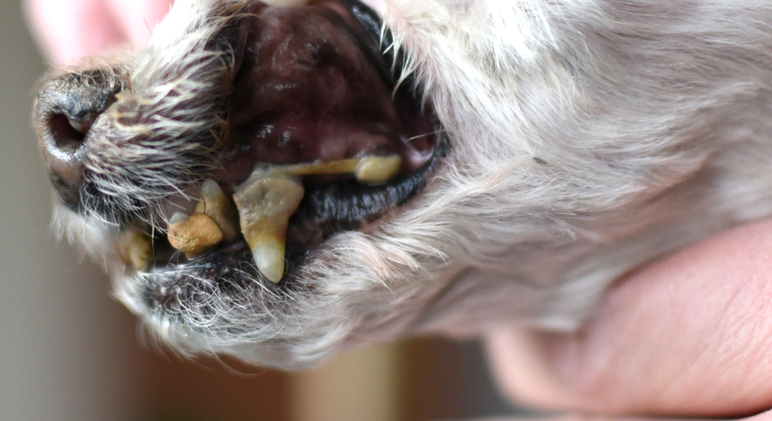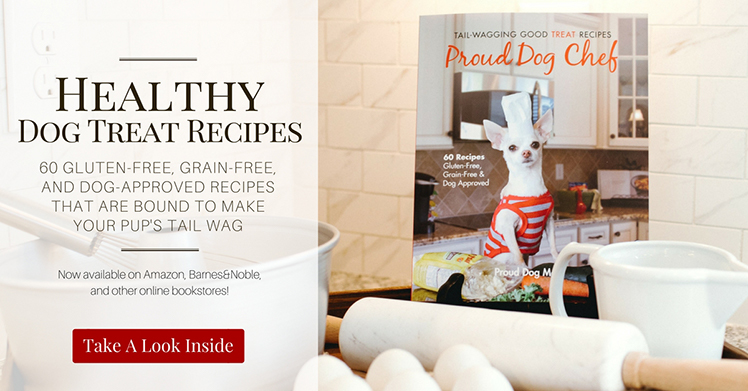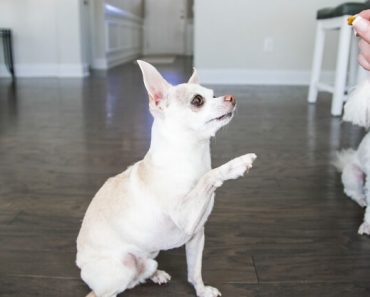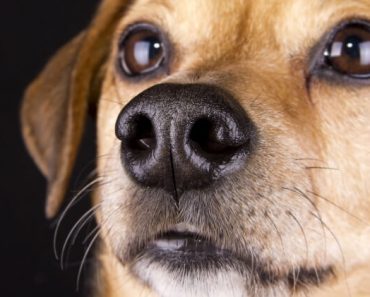February is National Pet Dental Health Month! To help raise awareness for the importance of canine oral care, here are 7 warning signs your dog’s teeth need more attention.
1. Plaque and Tartar Build-Up
Just like we strive for pearly white teeth, our dogs’ chompers should be stain-free too. But, if you’re not showing your pup’s teeth routine TLC then they will start to develop yellow/brown stains. Even a slight discoloration around the gum line should serve as a red flag since that bacteria can creep into your pup’s bloodstream and start affecting his internal organs.
The longer you allow plaque and tartar to build up, the worse it can become. In some cases, years of buildup have resulted in this (and, trust me, this isn’t comfortable for your dog!):
2. Stinky Breath
When puppies are first born, they have a slight skunk smell to their breath. As they mature, though, your dog’s breath should be relatively odorless (just like yours after a good morning brush). If you notice changes in your pup’s breath, don’t just turn your nose up. Bad breath is often a result of bacteria build-up, decay, or infection. So, if your dog’s breath is consistently unpleasant, it’s time to schedule a dental check-up.
3. Bleeding Gums
Healthy gums should be pink and firm. Poor dental hygiene, on the other hand, can lead to sensitive, inflamed, and bleeding gums. If you notice your dog’s gums are sensitive when brushing or you find blood on their favorite toys, it’s time to take action.
4. Loose Teeth
Adult dogs should not have loose or wobbly teeth. If you notice any loose teeth, it may indicate advanced dental issues such as gum disease or tooth root abscesses. Here’s the thing: When a dog suffers from periodontal disease, tartar spreads under the gum line. This causes gum recession, bone loss, and an overall loss of the structure that supports a tooth. That means your dog’s teeth may start to come loose and even fall out. Regularly monitor your pup’s mouth so you know what’s normal and can easily spot changes.

5. Changes in Eating Habits
Think of it this way: If your teeth/gums are tender, sore, or in pain, do you want to indulge in a big meal? Unless it’s soup or something else that doesn’t require any chewing, the answer is pretty clear! Well, it’s the same with our canine companions. If you notice your pooch having difficulty chewing or he suddenly loses interest in the food bowl then schedule a vet dental exam ASAP.
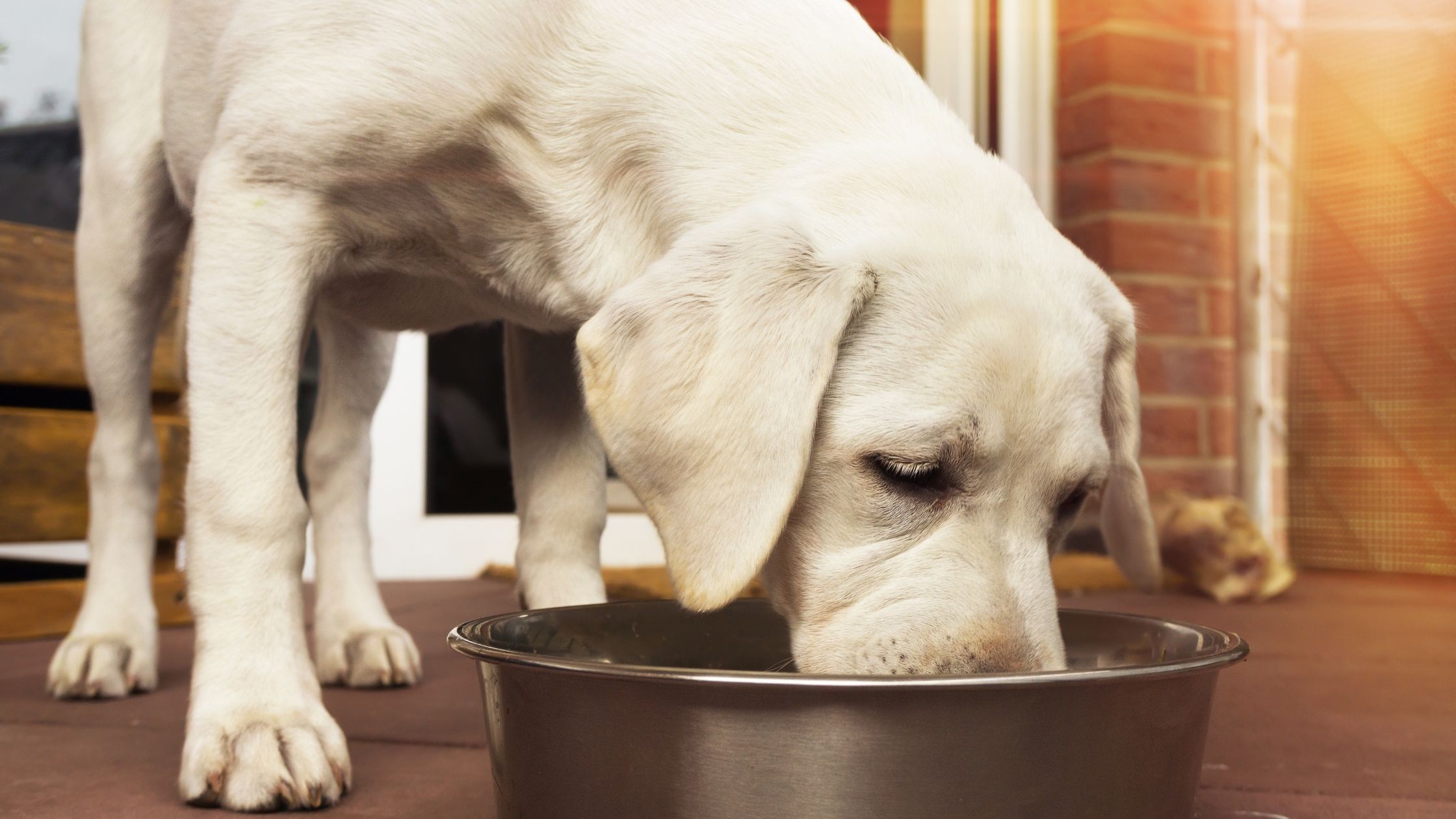
6. Constant Licking the Air
There are a few reasons why a dog compulsively licks the air, but one common cause is dental pain. A few years ago, I was dog-sitting a co-worker’s Chihuahua, who had very poor oral hygiene. That little boy would sit on my couch for hours and lick the air. Why? Well, it was his attempt to soothe the pain. If you find your pup repeating this behavior, it’s worth checking out his teeth.

7. Pawing at Mouth
Dogs are usually great at hiding their pain, but, other times, they point right to it. If your pup is pawing at his mouth, chances are, something is bothering him. He may have something caught between his teeth or he may be signaling oral pain.
Dog Breeds Most Prone To Dental Problems
- Chihuahuas
- Chinese Crested
- Poodles
- Maltese
- Yorkshire Terriers
- Pomeranians
- Cavalier King Charles Spaniel
- Shelties
- Papillion
- Greyhounds
- Dachshund
- Pugs
While some breeds are more prone to periodontal disease than others, cleaning your dog’s teeth (regardless of their breed) is important!
Are Your Dog’s Teeth Making Him Sick?
According to Dogs Naturally, more than 70 percent of dogs and cats will suffer from periodontal disease (AKA gum disease) by the time they’re just two years old. That’s a pretty scary statistic! Now that you’ve seen the warning signs of poor oral care, find out what a lack of dental attention could mean for your pet in this article.
Oral Care Products
If your pup shows any of the signs listed above, consult with your vet. Additionally, it’s essential to adopt a regular oral care routine. One of the best things you can do for your fur kid is to start brushing his teeth. In THIS article, I share a step-by-step guide for getting your dog comfortable with routine brushing and tips for success.

